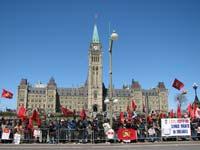'We are looking for a number of things from Sri Lanka'

By Mata Press Service
Sri Lanka risks pariah nation status by Canada if it does not accept an independent investigation into allegations that its government forces committed war crimes and crimes against humanity in the final months of the country’s civil conflict in May 2009.
Demanding better human rights accountability from Colombo and a strident reconciliation plan with the island-nations Tamil population in the national democratic process, Canadian Prime Minister Stephen Harper said he remains concerned about the Commonwealth holding its next summit in Sri Lanka.
“We are looking for a number of things from Sri Lanka. We’re looking for action on the events around the conflict in that country. We’re looking for action on refugees and displaced persons. And we’re looking for action on political reconciliation,” Harper said in response to a question by South Asian Post publisher Harbinder Singh Sewak.
“And to this point the Sri Lankan government has done nothing to reassure (us),” he said at a meeting with Vancouver ethnic media representatives on the sidelines of the Grey Cup events last weekend.
The Sri Lankan government has refused to accept an independent investigation — a position criticized openly at the recent Commonwealth leader’s summit in Australia.
Harper said Canada will not attend the next Commonwealth summit in Sri Lanka in 2013 if its concerns are not addressed.
A UN report commissioned by Secretary-General Ban Ki-Moon recently found “credible allegations” that Sri Lankan government forces and the rebel Tamil Tigers committed war crimes and crimes against humanity in the final months of the country’s civil conflict in May 2009.
The three-member panel commissioned by the UN, which gathered evidence over 10 months, said that “most civilian casualties in the final phases of the war were caused by government shelling”.
It alleged hospitals and Red Cross ships were shelled, prisoners shot in the head and women raped. It found the Tamil Tigers used civilians as human shields and killed those who tried to flee areas under their control.
The Sri Lankan government has consistently denied the allegations, accusing the UN of bias and lobbying allies such as China to block any moves to censure it.
Harper said he was not satisfied Sri Lanka had done enough to prove its commitment to human rights, democratic values and political reconciliation.
The Sri Lankan government, however, has refused to accept an independent investigation saying it will be a violation of its sovereignty.
“The Commonwealth has always suspended countries where governments essentially are unlawful, where there’s military coups or where there has been no sense of a rule of law or a constitutional foundation of government ... I think those things are important. I remain concerned about the Commonwealth holding a summit in Sri Lanka. Obviously, the Commonwealth’s made that decision, made the decision some years ago. But I am concerned that that does not reflect well on the image of the Commonwealth,” the prime minister said.
Canada is the second-largest contributor to the Commonwealth. Canada also has a long-standing relationship with Sri Lanka. It has contributed hundreds of millions of dollars in aid since the 1950s, including $35 million since the civil war ended.
Harper’s demands come as a senior Sri Lankan minister said his country will survive if Canada cuts its aid.
It would be a big loss but we will do without, Vasudeva Nanayakkara told Postmedia news in an interview.
Nanayakkara alleged Harper and the Canadian government are being swayed by members of Canada’s estimated 300,000-strong Tamil community in their demands for an independent investigation.
“This diaspora has prominent offices, prominent cadres and paid cadres who run offices in order to keep disseminating their information,” he said, according to Postmedia News.
“Perhaps the legislators and the political parties tend to think what the diaspora Tamils, hardliners, are now complaining about is all true.”
Harper dismissed those claims in his response to the South Asian Post.
“I understand and I’ve said repeatedly the government understands that the government of Sri Lanka, its decision to take on the Tamil Tigers, our view was that this is a terrorist organization. We’ve listed it in Canada as such. But there’s not enough to dealing with the ethnic conflict in that country. There’s more than just simply taking on the Tamil Tigers,” said the prime minister.
Canadian Tamil Congress spokesman David Poopalapillai rejected the allegations, saying Canada is standing up for human rights.
“We are very happy as Tamil-Canadians that Canada and the prime minister have taken a very strong stand on this,” he said. “Traditionally, Canada has stood for marginalized people. I think our prime minister is following the same path.”
Sri Lanka’s president Mahinda Rajapakse has condemned the “tainted” international allegations of a military massacre of civilians during an assault to end a Tamil rebellion.
“My country has reason for concern with approaches tainted by an unacceptable selectivity, which we have brought to the notice of the organisations in question in recent weeks,” Rajapakse told the UN.
Defending the government campaign, Rajapakse said “after three decades of pain and anguish, today Sri Lankans of all ethnicities living in all parts of Sri Lanka are free from LTTE (Tamil Tigers) terror and no longer live in a state of fear.”









